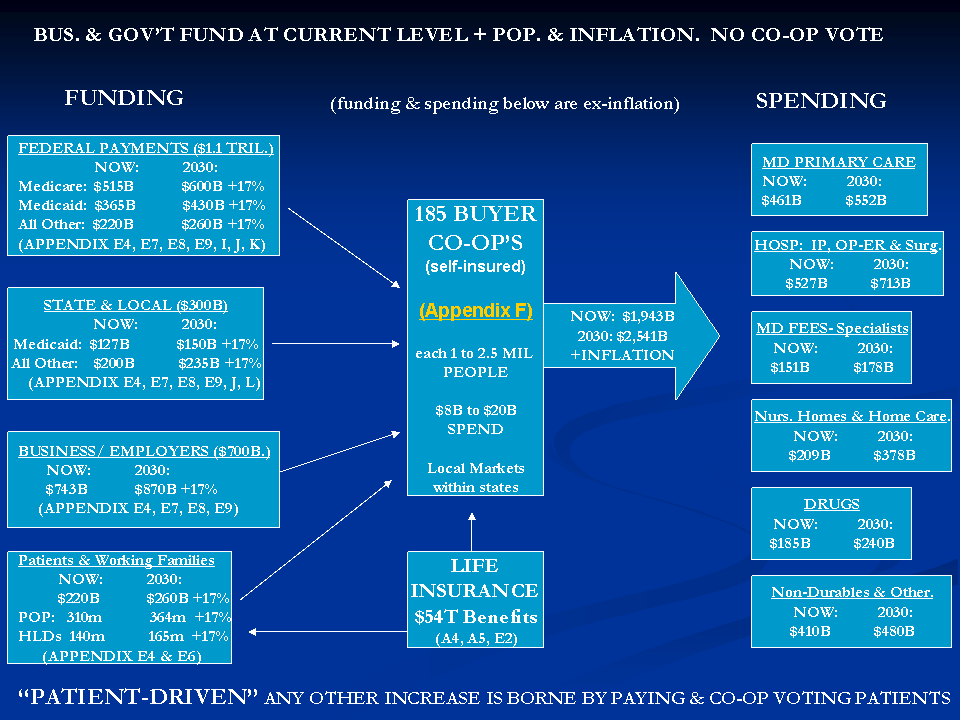RIbetter [email protected]
KISS PLAN FOR HEALTH
Health Care, like many markets in the USA, is so dominated by sellers & Gov’t lobbying as to not be a market at all. By reducing customers to 185 Self-Insured buying groups, this dynamic is completely changed.
The customer would be knowledgeable, financially strong and have the ability to say “NO” to sellers and make other arrangements. That’s the definition of a market. That’s what “PATIENT-DRIVEN” really looks like.
Limiting business & Gov’t to defined contributions, and insurers to benefit managers, gives them certainty & shifts risk to the direct “BUYER-SELLER RELATIONSHIP” cost reductions will result.
Using life insurance reduces financing to a “CASH FLOW TIMING” exercise. Death benefits from boomers who do not make old age, will pay health cost of those boomers who do. In 30 years death benefits will exceed health costs.
THIS PLAN SHOULD KEEP HEALTH COST AT $2.5 TRILLION +INFLATION OVER THE NEXT 20 YEARS AND CUT IT IN HALF AS % OF GDP. 100% ACCESS.
We envision ACA (Obamacare) as a transition step away from the employer based insurance system. Employers will "dump" their employees into the state exchanges to limit their exposure to run-away health inflation in favor of a fixed payment (penalty etc). In fact, in the Rhode Island exchange, small businesses can give their employees a stipend to shop for insurance in the exchange. Market forces are likely to force most employees into the state exchanges over time and their employers will pay fixed payments. Federal, State & Local governments (as employers) will be subject to the same market & budget pressures (to an even greater extent). Exchanges will morph into employee buying groups (as in the KISS plan).
Initially the employees in the exchanges will continue to buy insurance. Ultimately, insurers will become benefit managers charging a fixed fee and percent of payments processed as they do today for their large self-insured customers. Again market forces will move insurers in this direction as their ability to pass cost increases to employees (in the exchanges) becomes limited. The exchanges will (by virtue of market forces) become buying groups negotiating directly with providers (no insurance co just self-insured groups as in the KISS plan).
The politics will be difficult on the provider side as they fight to keep medicaid & medicare patients out of the exchanges and to maintain their pricing advantage. But Federal budget realities will prevail. The insurance model is dead and most businesses (in the Chamber of Commerce) would benefit from limited exposure to health inflation. Providers would be isolated, politically. Patients would get lower cost and no less choice than employer benefit plans chosen for them currently.
The politics could work. Even providers will continue to grow volume as the population ages.
BEYOND HEALTH: the 185 buyer groups could expand to purchase other products & services. Each local market making their own decisions to support sellers who promote local employment & investment while perhaps accepting higher prices or supporting sellers that provide lower prices using foreign produced products. This consolidation of buyers would have a dramatic impact on: price stability, employment, income inequality, poverty, crime, rural development, etc. Sellers would have to more seriously consider buyer's reactions. Buyers would be more equal market participants.

